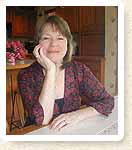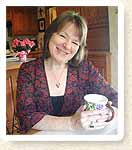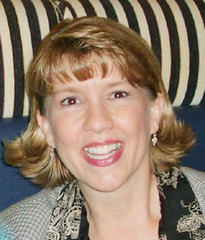



Personal blog of christian
writer & fallible mom
Katy McKenna Raymond
in Kansas City, Missouri

Katy is represented by
Greg Johnson at
WordServe Literary

Read more Katy at
LateBoomer.net




Small Towns, Big Issues, Wonderful Author
 Have you read a Deborah Raney book lately? Today, I’m pleased to bring you the lady herself, whom I’ve had the joy of meeting on several occasions. Last fall, at the American Christian Writers Conference, I sat under the teaching of Deb and fellow-author Colleen Coble. I learned so much from them that I still haven’t absorbed it all.
Have you read a Deborah Raney book lately? Today, I’m pleased to bring you the lady herself, whom I’ve had the joy of meeting on several occasions. Last fall, at the American Christian Writers Conference, I sat under the teaching of Deb and fellow-author Colleen Coble. I learned so much from them that I still haven’t absorbed it all.
Just a few months ago, the tenth-anniversary of the release of her first book, A Vow to Cherish, was celebrated with a new edition. And the movie by the same name? I finally saw it on TV! Man, did I bawl over the female lead’s early-onset Alzheimer’s and the test it presented to the strength of her marriage.
So I asked Deb if she shed more tears over contracting that first book, or over selling the movie rights to it.
“I CHEERED on both counts!” she says. “And declared it pizza night! No bawling either time.”
I would have cheered, too. Because Deb’s writing career started as a kind of do-or-die deal, and the success of her first novel helped her avoid life in a cubicle. I’ll let her tell you how it happened.
“From the time I was 11 or 12 and read all the Little House on the Prairie books, I held onto a dream of someday writing a book. But after our kids came along—four of ‘em!––I definitely put that dream on the back burner. I’d remember it every time I read an especially satisfying novel, and think ‘Oh, how I’d LOVE to write something that wonderful someday!’ but it just didn’t seem possible. It was only when I faced taking a day job to help our kids through college (but I still had a three-year-old at home and desperately wanted to stay home with her) that I got serious about making my dream come true.”
I’m sorry, but that’s a great story. It’s amazing what the spectre of a looming day job will inspire. :) If you pay a visit to Deb’s site, you can click on photos of her in her beautiful and inspirational home office, a room she’s only recently acquired as her writing space. In fact, until not too long ago, Deb worked in a corner of her living room, with her family surrounding her. I’m afraid that would be enough to reduce a lesser woman to tears and yes, I am a lesser woman.
Since we seemed to be on the recurring theme of bawling our heads off, I wondered how often Deb weeps while writing a particularly moving scene. I mean, people, I cry a lot about MY writing, but it’s rarely because it’s GOOD.
“I definitely weep my way through my emotional scenes. Not quite as much as I used to—I guess I’m growing jaded. ; ) But I never feel a scene that’s meant to be touching is quite there unless it’s made ME cry. I have also bawled a couple times when I was frustrated about a book. A Nest of Sparrows in particular brought me to my knees, thinking it was impossible to make my plot work. Of course, on my knees was exactly where I needed to be at that point, and truly, the story almost wrote itself once I confessed to God my utter inadequacy to write the story without His help.”
I highly recommend A Nest of Sparrows, the first Deborah Raney book I read. From the beginning of the story—and yes, it opens tragically—I could NOT figure out how it could end well. Or even somewhat satisfactorily. And yet, the story had a redemptive quality to it that I think is often missing in women’s fiction, a category which most often revolves around a current-day issue.
Deb tackles subjects like substance abuse, children falling through the cracks of social services, and domestic violence. While we often think of those problems occuring chiefly in larger cities, Deb’s stories take place in small towns. I wanted to know why she’d made that choice for her novels, and if she could explain to me why it works so well.
“Life in a small town is very precious and special, but the same problems and trials and tragedies exist here as any place. I think the difference, perhaps—and this is both bane and boon—is that in a small town, you go through those experiences in community. Nothing hidden, but nothing borne alone, either. And I think that’s why it works in fiction. All the characters are so interconnected—in their shared pasts, in their present joys and sorrows, and in their hope for the future.”
Deb’s on to something. I think the big-city problems in the small-town context helps provide the secret to success for her latest novel, Remember to Forget. (You can purchase it on Amazon or at fine booksellers everywhere, but Deb can send you an autographed copy if you order through this site.)
It’s a contemporary love story (not to be confused with what we typically call a “romance novel”), and the entire book—blooming romance included—takes place in a short six-week time frame. Besides the two main characters meeting and falling in love, they both go through tremendous personal growth during those few brief weeks. I’m all about transformations, but it usually takes me DECADES to pull off any kind of sustainable, genuine change. So how is Deb able to make the changes Maggie and Trevor go through so believable? Does it take some type of huge “inciting incident” at the onset of the story?
“When I’m writing a romance, I sometimes worry that I’m moving things along too fast. I’ve known a few couples who knew, within a few weeks of meeting, that without a doubt God had brought them together. My husband and I knew within about two months that we loved each other and wanted to get married, but we—wisely, I think—waited a year before we actually tied the knot. It takes time to get to know someone well enough to have seen every side of them and to truly know what you’re getting when you say ‘I do.’ So I’m very cautious about sending out a message that might encourage some young reader to jump into love too fast, just because one of my characters did and it worked out okay for them. I think you hit the nail on the head when you mentioned a significant inciting incident. Usually my story begins when the protagonist is on the verge of change. Most of what she has been in the past is told in snippets of backstory. What the reader sees is the actual process of growth and change. In addition, I very often end the book (as in Remember to Forget) with the character simply realizing that God has been leading her toward this moment and now she must make a decision, or she must begin to live with a new attitude, etc. The reader understands that she will be successful in her quest for change, but doesn’t necessarily see that happen onstage—unless perhaps through an epilogue.”
As an epilogue to this time spent with Deb, I asked her if she could offer three succinct pieces of advice to those readers who are also aspiring novelists. We poor insecure writers thrive on this stuff, don’t we?
“First of all, read voraciously. Read the kind of books you’d like to write. At the same time, practice writing by…well, duh: WRITING! Write every day. If journaling helps you write better, go for it (I haven’t journaled since high school. It feels like a waste of words to me, but I know people who can’t begin their day without it.) Write the story of your heart, but don’t spend the rest of your life trying to get that story published. When it’s finished, do what you can to find a publisher, but while you wait, write the next story. Chances are it will be that one, or the one after that, or the one after that, that will be your breakthrough. Finally, budget for your writing. Earmark every penny you possibly can for writers conferences. Don’t expect to pitch a proposal at the first conference. Go simply to learn. Come home and practice what you learned. Lather, rinse, repeat.”
In the spirit of lathering, rinsing, and repeating, we’ll be giving away a free copy of Remember to Forget to a randomly chosen commenter on this post. So here’s your chance, folks! Knowing Deb, she might even check in here to leave a fallible comment herself, but no, she will NOT be eligible for the complimentary volume. Sorry, Deb! :)
Deb, thanks so much for sharing with us. It’s been a delight and a pleasure to have you here!
- Deb is wonderful, isn't she?
Posted by T.F. on 02/12/07 at 09:59 PM
- Fabulous interview! And Deb is just as sweet and real as her books--and this interview!
Posted by Colleen Coble on 02/12/07 at 11:01 PM
- Yes, small towns do offer a different sense of community. They're gossipy but they come together at the right moments, usually.
Loved the interview. I'm heading over to see Deb's home office...Posted by Photo Buffet on 02/12/07 at 11:55 PM - Thanks Katy and Deb for this chance to hear more of Deb's wisdom and try to win her new book which is the only one of hers I don't have yet, I think. I'm getting ready to start A Nest of Sparrows tonight and look forward to it even more after this review. thanks, rose
Posted by rose mccauley on 02/13/07 at 04:39 PM
- What?! A chance to win another book on fallible? Hey, maybe the snow day off from school will bring me luck today....
Posted by Bridget on 02/13/07 at 05:39 PM
- I've never read one of Deborah's but after reading about her books I will definetly get one! Hopefully I'll win one and then I'll buy a different one!
Posted by Vail on 02/13/07 at 06:54 PM
- Tina--She's a doll. I'm looking forward to reading my first Tina Forkner book! :)
Colleen--Are you knowed in yet??? We managed to get off our road this morning. Yesterday, we went to the grocery and only spent $45 in storm preps. I told Doug how much you and your hubby spent and how you had to buy fudge ingredients. He got a big laugh out of that!
Photo Buffet Bonnie--How are you, lady? Deb's office pics actually inspired me when I set up *another* desk in our bedroom.
Rose--You are WAY ahead of me and deserve to head the fan club!! I am attempting to make up for the lost years when I did not know of Deb's writing, though. I may get there yet!
Bridget--YES!! Snow Days should have many rewards attached to them. And fallible has no rule which prevents a previous winner from winning again. Best wishes, little sister!
Vail--Welcome! I think winning a book is a fine way to be introduced to a new author. Whether you win or not, though, Deb's sticking around. Her books have a solid following of readers for good reason. I hope you enjoy them!Posted by Katy on 02/13/07 at 07:12 PM - What a great interview, Katy! I'll be checking out Deb's books next time I hit the bookstore...count me in for the contest if you haven't already chosen a winner.
Posted by Kelley Mathews on 02/14/07 at 04:05 AM
- Great interview, Katy!
Thanks for the heads-up on another author I now really want to read!Posted by Chris(tine) on 02/14/07 at 06:07 AM - Kelley--Hey, girl! I'm about to draw the name of a winner, so stay tuned....
Chris(tine)--You are most welcome! So far, I've only featured authors that I've met or have something of an online relationship with--or both! These writers are some of the best people I've ever known.Posted by Katy on 02/14/07 at 03:30 PM - Hey, congratulations, Vail! So glad you won! And Katy, thanks for a FUN interview. You actually made me sound interesting! LOL!
Happy Valentine's Day to all of you wonderful readers!
DebPosted by Deb Raney on 02/14/07 at 08:34 PM
Next entry: Vail!
Previous entry: Inflation And Hyperventilation
